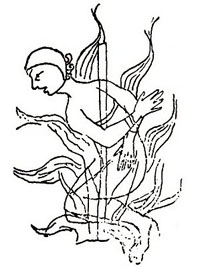What Catholic Councils have said about the Cathars
Council of Tours 1163, Canon 4: Action against the Cathars
In 1162 Pope Alexander fled Italy into exile in France into under the protection of King Louis VII, the Church being in schism. Alexander arrived in France in April that year, where he was received by King Henry II of England and King Louis of France at Tours on the Loire. Alexander summoned to Tours an international council of prelates from those kingdoms which supported his cause. The Council of Tours opened at Pentecost, on 19th May 1163. Seventeen cardinals, twenty-four bishops and four hundred and fourteen abbots met. Thomas Becket, Archbishop of Canterbury, was given pride of place at the Council. Alexander, in his opening address, declared that the council should be regarded as a General Council of the Catholic Church.
It was at this Council that the Albigensians were declared heretics, to be shunned, outlawed, sought out by the authorities and arrested. Christian princes were called upon to seek them out, punish them by imprisonment and to confiscate their property. The Cannon refer to Albigensian (ie Cathar) "heresy" by name, but does not mention any of its characteristic beliefs.
|
Ut cuncti Albigenisium haereticorium consortium fugiant. In partibus Tolosae damnanda haeresis dudum emersit, quae paulatim more cancri ad vicina loca se diffundens, per Guasconiam et alias provincias, quamplurimos jam infecit. Quae, dum in modum serpentis intra suas evolutiones abscondilur, quanto serpit occultius, tanto gravius Dominicam vineam in simplicibus demolitur. Unde contra eos, episcopos et omnes Domini sacerdotes in illis partibus commorantes vigilare proocipimus, et sub interminatione anathematis prohibere, ut ubi cogniti fuerint illius heeresis sectatores, ne receptaculum quisquam eis in terra sua praebere, aut presidium impertire praesumat. Sed nec in venditione aut emptione aliqua cum eis omnino commercium habeatur: ut solatio saltem humanitatis amisso ab errore vitae suae resipiscere compellantur. Quisquis autem contra haec venire tentaverit tanquam particeps iniquitatis eorum anathemate feriatur. Illi vero si deprehensi fuerint per Catholicos principcs custodies mancipati omnium bonorum amissione muletentur. Et quoniam de diversis partibus in unum latibulum crebro conveniunt, et preeter consensum erroris nullam cohabitandi causam habentes, in uno domicilio commorantur; talia conventicula et investigentur attentius, et si vera fuerint, canonica severitatis vetentur.
|
That the Albigensian heretics are to be shunned. In parts of Toulouse a damnable heresy has recently emerged, which is gradually spreading towards neighbouring areas and diffusing like a canker, through to Gascony and other provinces; many of which are already infected. Which, while in the form of a snake hiding inside its coil how much more it creeps secretly, more seriously while the Lord's vineyard those of a simple-mind are destroyed. Wherefore against them, we command that the bishops and all the priests of the Lord having their abode in those parts to be vigilant, and under the penalty of anathema to prohibit them where they are known to follow this heresy, nor to afford any one of them shelter on their land, or presume to impart protection. Commercial trade with them is forbidden; neither the sale nor the purchase of things may be undertaken with them, in order that that source of comfort to mankind might at least force them to see the errors of their lives to return to their senses. But if any man should attempt to be in opposition to this, and found to be a participant in this iniquity they shall be smitten by anathema. They are to be put into custody by Catholic princes and suffer the loss of all goods. And because the different parties residing in a covert, often come together, residing in one house, having the home colony, such meetings are to be carefully investigated, and if they are found, they are to be forbidden with all due canonical strictness. [This translation is very flaky at the end] |
|
|
|







